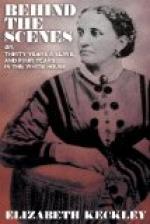This place where I was halted was Nelson’s farm,
and the house was held as headquarters for a company
of rebel soldiers, known as bushwhackers. While
they belonged to the rebel army, they were, in a measure,
independent of its regulations and discipline, kept
back in the woods, ready for any depredation upon the
property of unionists—any outrage upon their
persons. The soldier who had halted me took me
up to the house, and all began to question me.
I told them that I had been sent on an errand, and
that I had lost my way. The next morning I was
taken about a mile away down in the swamp, over hills
and through winding paths, till at last we came to
the regular rebel camp. I was in great fear and
thought my end had come. Here they began to question
me again—the captain taking the lead; but
I still stuck to my story that I had been sent on
an errand, and had lost my way. I knew that this
was my only chance. They tried to make me say
that I had come from the Yankees, as they were in
camp near Holly Springs. They thought the Yankees
had sent me out as a spy; but I said the same as at
first—that I had lost my way. A soldier
standing by said: “Oh! we will make you
talk better than that;” and stepping back to
his horse, he took a sea-grass halter, and said:
“I’ll hang you.” There was a
law or regulation of the rebel government directing
or authorizing the hanging of any slave caught running
away; and this fellow was going to carry it out to
the letter. I talked and pleaded for my life.
My feelings were indescribable. God only knows
what they were. Dr. Carter, one of the soldiers,
who knew me and the entire McGee family, spoke up and
said: “You had better let me go and tell
Mr. Jack McGee about him.” The captain
agreed to this, and the doctor went. The following
day, Old Jack came, and steadily refused to consent
to my being hung. He said: “I know
Edmund would not have him hung-ung. He is too
valuable-aluable. No, no! we will put him in
jail and feed him on bread and water—too
valuable a nigger to be hung-ung.”
They tried again to make me say that I was with the
Yankees. They whipped me a while, then questioned
me again. The dog-wood switches that they used
stung me terribly. They were commonly used in
Mississippi for flogging slaves—one of
the refinements of the cruelty of the institution
of slavery. I refused to say anything different
from what I had said; but when they had finished whipping
me I was so sore I could hardly move. They made
up their minds to put me in jail at Panola, twenty-two
miles away, to be fed on bread and water. The
next day was Sunday, and all arrangements having been
made for taking me to the place appointed for those
whose crime was a too great love for personal freedom,
they started with me, passing on the way Old Master
Jack’s, where they halted to let him know that
his advice respecting me was to be carried out.
The old man called to my wife: “Come out
and see Louis.” Some one had told her that




